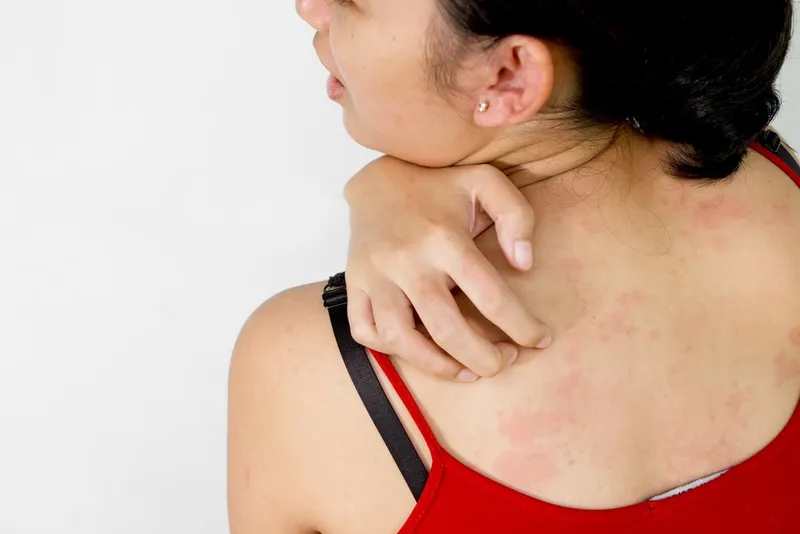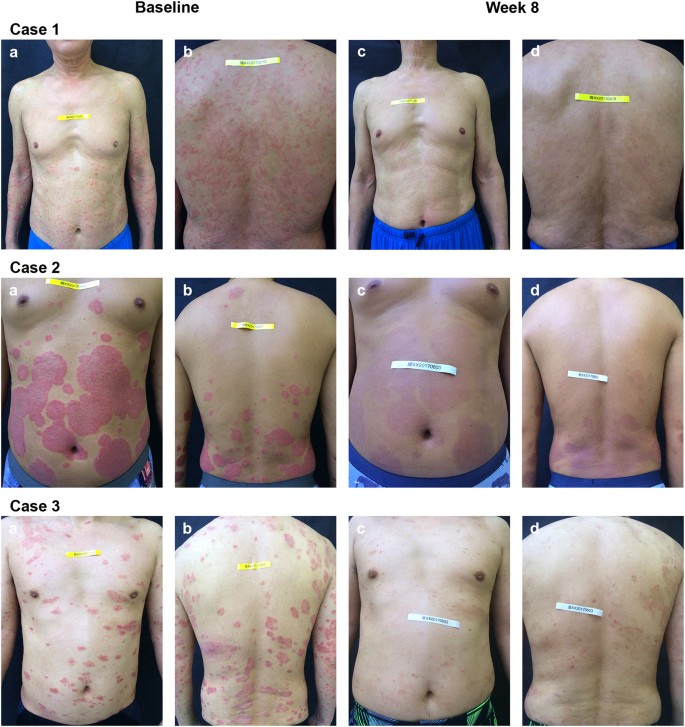Hydrogen helps with psoriasis and parapsoriasisScientific Research

Positive effects of hydrogen-water bathing in patients of psoriasis and parapsoriasis en plaques
https://doi.org/10.1038/s41598-018-26388-3
Qinyuan Zhu, Yueshen Wu, Yongmei Li, Zihua Chen, Lanting Wang, Hao Xiong, Erhong Dai, Jianhua Wu, Bin Fan, Li Ping & Xiaoqun Luo
Abstract
Psoriasis and plaque psoriasis are chronic inflammatory skin diseases, both of which represent treatment challenges and compromise quality of life in daily practice. Reactive oxygen species (ROS) have been shown to be involved in the pathogenesis of chronic inflammatory diseases. We now report that hydrogen water is an effective ROS scavenger that significantly and rapidly improves disease severity and quality of life in patients with psoriasis and plaque psoriasis. At week 8, our parallel-controlled study showed that 24.4% (10/41) of patients who received the hydrogen water bath had at least an improvement in the Psoriasis Area Severity Index (PASI) compared to 2.9% of patients 75% (1/34). Control group (Pc = 0.022, OR = 0.094, 95% CI = [0.011, 0.777]). In the bathing patients, 56.1% (23/41) had at least a 50% improvement in the PASI score compared to 17.7% (6/34) in the control group (P=0.001, OR = 0.168, 95%) CI = [ 0.057, 0.492]). Significant improvement in itching was also observed (P = 3.94 × 10-4). In addition, at week 8, 33.3% (2/6) of patients with plaque parapsoriasis had a complete response to these chronic inflammatory skin conditions and 66.7% (4/6) had a partial response.
Results
Improve psoriasis
A total of 41 patients with psoriasis were assigned to the hydrogen water bath treatment group and 34 patients were assigned to the control group. Treatment groups were well balanced with respect to demographics and baseline characteristics (Table 1). Only one patient in the control group was discontinued due to lack of improvement during the week 2 study period and was counted as a non-responder in the control group. After 8 weeks of bath treatment, the reaction was obvious. At week 8, the mean Psoriasis Area Severity Index (PASI) score and mean Visual Analogue Score (VAS) score in the hydrogen water bath group were 5.8 and 0, respectively, significantly lower than the baseline scores (P=7.08 × 10-6 ; P = 2.42 × 10−5).
Table 1 Characteristics of the psoriasis patients.
From: Positive effects of hydrogen-water bathing in patients of psoriasis and parapsoriasis en plaques
| The Hydrogen-water bathing group | The control group | |||
|---|---|---|---|---|
| Baseline | Week 8 | Baseline | Week 8 | |
| No | 41 | 41 | 34 | 33 |
| Sex(male/female) | 24/17 | 24/17 | 18/16 | 18/15 |
| Age | 40 ± 15 (18–78) | 40 ± 15 (18–78) | 39 ± 12 (18–72) | 39 ± 13 (18–72) |
| BMI | 23.8 ± 3.8 (17.5–35.5) | 23.7 ± 3.9 (17.2–35.6) | 23.1 ± 4.2 (15.5–31.4) | 23.0 ± 4.6 (15.3–31.4) |
| Waistline (cm) | 82.7 ± 10.3 (63.3–103.3) | 82.8 ± 9.8 (63.3–103.3) | 76.8 ± 8.7 (58.2–95.4) | 76.8 ± 8.9 (58.2–95.4) |
| PASI score | 9.8 ± 5.9 (1.4–25.2) | 5.8 ± 5.5 (0.2–25.2) | 8.5 ± 4.1 (2.8–23.8) | 7.9 ± 6.8 (0.8–34.5) |
| VAS score (median, range) | 2 (0–8) | 0 (0–4) | 0 (0–7) | 0 (0–9) |

DOI: 10.1038
Published on: 23/05/2018
Positive effects of hydrogen-water bathing in patients of psoriasis and parapsoriasis en plaques
https://doi.org/10.1038/s41598-018-26388-3
Qinyuan Zhu, Yueshen Wu, Yongmei Li, Zihua Chen, Lanting Wang, Hao Xiong, Erhong Dai, Jianhua Wu, Bin Fan, Li Ping & Xiaoqun Luo
Abstract
Psoriasis and plaque psoriasis are chronic inflammatory skin diseases, both of which represent treatment challenges and compromise quality of life in daily practice. Reactive oxygen species (ROS) have been shown to be involved in the pathogenesis of chronic inflammatory diseases. We now report that hydrogen water is an effective ROS scavenger that significantly and rapidly improves disease severity and quality of life in patients with psoriasis and plaque psoriasis. At week 8, our parallel-controlled study showed that 24.4% (10/41) of patients who received the hydrogen water bath had at least an improvement in the Psoriasis Area Severity Index (PASI) compared to 2.9% of patients 75% (1/34). Control group (Pc = 0.022, OR = 0.094, 95% CI = [0.011, 0.777]). In the bathing patients, 56.1% (23/41) had at least a 50% improvement in the PASI score compared to 17.7% (6/34) in the control group (P=0.001, OR = 0.168, 95%) CI = [ 0.057, 0.492]). Significant improvement in itching was also observed (P = 3.94 × 10-4). In addition, at week 8, 33.3% (2/6) of patients with plaque parapsoriasis had a complete response to these chronic inflammatory skin conditions and 66.7% (4/6) had a partial response.
Results
Improve psoriasis
A total of 41 patients with psoriasis were assigned to the hydrogen water bath treatment group and 34 patients were assigned to the control group. Treatment groups were well balanced with respect to demographics and baseline characteristics (Table 1). Only one patient in the control group was discontinued due to lack of improvement during the week 2 study period and was counted as a non-responder in the control group. After 8 weeks of bath treatment, the reaction was obvious. At week 8, the mean Psoriasis Area Severity Index (PASI) score and mean Visual Analogue Score (VAS) score in the hydrogen water bath group were 5.8 and 0, respectively, significantly lower than the baseline scores (P=7.08 × 10-6 ; P = 2.42 × 10−5).Table 1 Characteristics of the psoriasis patients.
From: Positive effects of hydrogen-water bathing in patients of psoriasis and parapsoriasis en plaques
The Hydrogen-water bathing group The control group Baseline Week 8 Baseline Week 8 No 41 41 34 33 Sex(male/female) 24/17 24/17 18/16 18/15 Age 40 ± 15 (18–78) 40 ± 15 (18–78) 39 ± 12 (18–72) 39 ± 13 (18–72) BMI 23.8 ± 3.8 (17.5–35.5) 23.7 ± 3.9 (17.2–35.6) 23.1 ± 4.2 (15.5–31.4) 23.0 ± 4.6 (15.3–31.4) Waistline (cm) 82.7 ± 10.3 (63.3–103.3) 82.8 ± 9.8 (63.3–103.3) 76.8 ± 8.7 (58.2–95.4) 76.8 ± 8.9 (58.2–95.4) PASI score 9.8 ± 5.9 (1.4–25.2) 5.8 ± 5.5 (0.2–25.2) 8.5 ± 4.1 (2.8–23.8) 7.9 ± 6.8 (0.8–34.5) VAS score (median, range) 2 (0–8) 0 (0–4) 0 (0–7) 0 (0–9)




